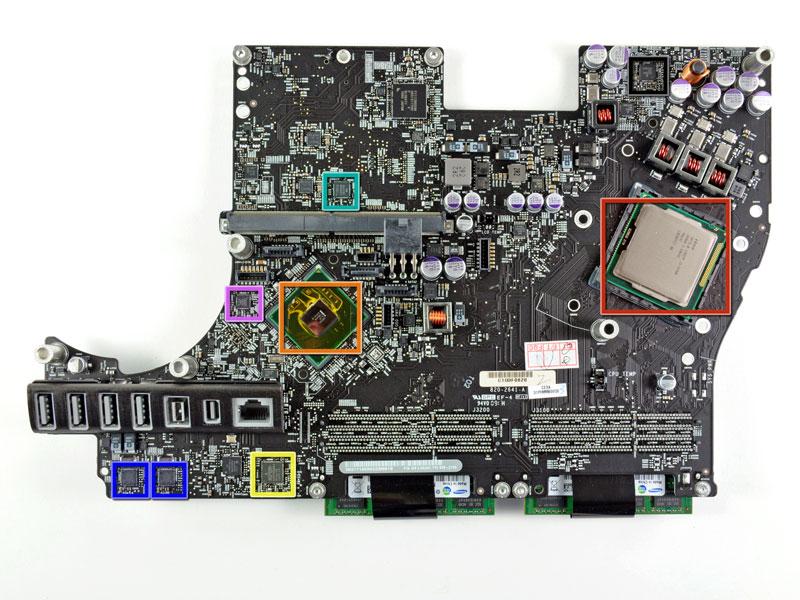As picked up on by tonymacx86, the Intel Z68 chipset for Sandy Bridge 1155 is not set to debut for another week, on May 11. Yet Apple's new Thunderbolt-equipped iMacs, released on Tuesday, were granted first access to the new chipset.
The Z68 chipset allows for solid-state drive data caching when a system is equipped with either a hybrid SSD/traditional drive or a combination of a SSD and a traditional drive in the same machine. Apple's new iMacs, in both the 21.5-inch and 27-inch screen sizes, come with a build-to-order option for a 256GB solid state drive.
User "diver" on the tonymacx86 forums speculated that since Apple's SSD option is 256GB and an extra $500, it's unlikely that Apple is using the caching feature, which is intended to boost performance with hybrid drives or smaller, cheaper solid state drives. Apple's upgrade comes with Mac OS X and all applications installed entirely on the solid state drive by default, while the extra 7200rpm spinning disk drive can be used for storing media and files. But the inclusion of the Z68 could signal the adoption of hybrid drives or solid-state boot drive combos in future Macs.
Apple's adoption of the Z68 chipset was noticed after iFixit conducted its teardown of the new 21.5-inch quad-core iMac. That look inside the machine revealed the Intel BD82Z68 Platform Controller Hub.
It is not new for Apple to be the first to sport Intel's latest hardware in its devices. Apple has previously enjoyed short-term exclusivity of Intel chips in its Macs in years past.
And the new high-speed Thunderbolt port, developed by both Intel and Apple, first appeared on the new MacBook Pros introduced earlier this year. Intel said in February that Apple will have a year-long head start in deploying the technology, which allows data transfer rates of 10Gbps.
 Katie Marsal
Katie Marsal








 Marko Zivkovic
Marko Zivkovic
 Christine McKee
Christine McKee
 Andrew Orr
Andrew Orr
 Andrew O'Hara
Andrew O'Hara
 William Gallagher
William Gallagher

 Mike Wuerthele
Mike Wuerthele
 Bon Adamson
Bon Adamson


-m.jpg)


18 Comments
The Caching features will need Software to work with it. which will properly debut with Lion.
Oh no, guinea pig iMac users using unreleased to the public chipsets!!!! Run for the hills!
I don't think the idea of using SSDs for caching a magnetic disk is going to take off. People will simply use a magnetic disk as their media drive and an SSD for everything else.
So if they're using this chipset, why is it still showing up as just SATA II instead of III?
I'd love to see implementation of SSD for caching. It would be perfect for the way I work - I have a ton of data on my hard drives but for the most part I'm only accessing a small subset of it on a regular basis (and need the highest speed that I can get). Right now my options are putting everything on SSD (way too expensive) or trying to manually put the data I use most onto SSD which simply isn't possible with my setup. I assume that I'm in the minority, but I could see it being helpful in general.
Hybrid drives are a step in the right direction but not a workable solution for me since I need much more on the SSD part than most hybrid drives hold. The possibility of having a HD and SSD installed with the computer handling the caching would be perfect.
If the feature is there, they should have included a small cheap-ish SSD as an option. Doesn't look too hard to put it in yourself, but OS support might be an issue, like with TRIM, Crossfire, etc.